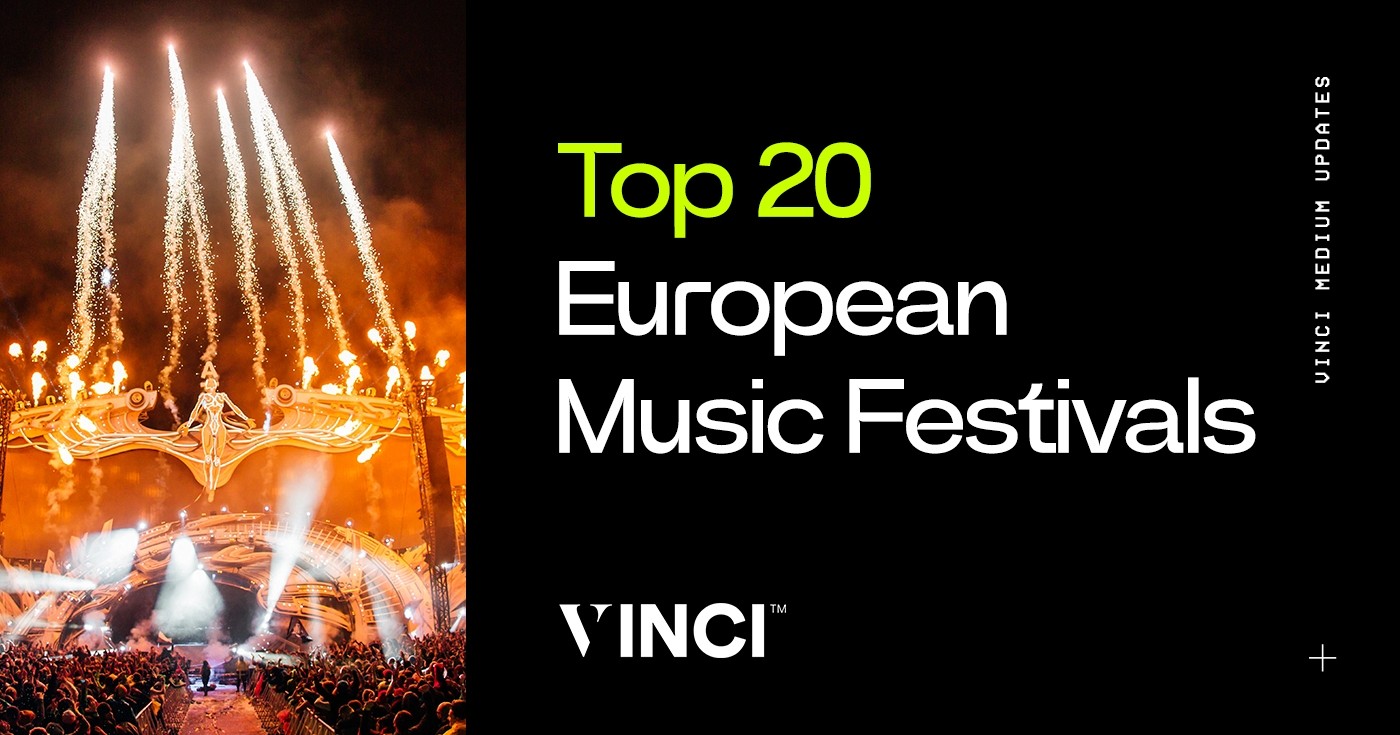Web3
How the blockchain can be the ultimate tool for festival organizers
There's a serious use case for running festivals on the blockchain
Sep 6, 2022
Of the many industries that stand to benefit from the implementation of blockchain technology, the events industry is one of the industries that stands to benefit the most.
Just think about the gargantuan logistical challenge that is organizing a festival for 120,000 people. With an incredible number of moving parts and people needed to ensure everything runs as smoothly as possible (or doesn’t descend into a Fyre Festival-like hell), blockchain can give festivals an invaluable tool that improves organization and transparency, boosts revenue streams, and heightens the overall experience for fans.
In this VINCI piece, we take a detailed look at how a festival works when it’s run on blockchain, noting the benefits from the perspective of organizers, artists, fans, and more. By the end, you may just see that blockchain and festivals aren’t just a good pairing; they’re an inevitable part of the event industry’s future.
Blockchain
Like we’ve gone over in previous VINCI articles, the blockchain is a type of distributed, decentralized database that is duplicated and distributed across a massive network of computers, making it practically impossible for anyone to change the data once it’s recorded. It has many potential applications, but what makes blockchain so legit is that they allow complete strangers to agree on a database knowing it hasn’t been tampered with, something that isn’t possible with databases stored on servers controlled by companies or institutions.
Within the music industry, blockchain is already being used to license music, allow fans to invest into artist royalties, eliminate expensive middlemen, improve ticketing, and in general, share information across different applications and organizations.
That last bit is especially useful when it comes to festivals, which always require the coming-together of several different parties. When data between all parties is interlinked, transparent, and easily viewable, a festival can be run much more efficiently.
Ticketing
Blockchain has the potential to revolutionize ticketing and create new, healthy streams of revenue. Since the Roman Era when tickets were hot for gladiator battles, ticketing has worked more or less the same: a central distributor releases a bunch of tickets (at fixed prices) for an event and they wind up on a secondary market where they are bought and sold at fluctuating prices by fans and opportunists. Though digital technology has given the system an update, the premise is still the same and many classic inefficiencies remain.
The major problem with conventional ticketing is the unregulated, disconnected power of third-party platforms that sell tickets on the secondary market. The issue is two-fold:
1). Once tickets are sold and enter the secondary market, organizers lose oversight over the data associated with those tickets. No longer can they measure nor plan for the demographics of their expected audience.
2.) Only a handful of platforms dominate the secondary market, leading to an oligopoly that has steadily increased ticket prices over the years.
So, what can blockchain technology do to solve the issues mentioned above?
When a festival sells a ticket through blockchain technology, that ticket is securely linked to the purchaser. However, if they can no longer attend the event and want to sell the ticket, they can sell the ticket via the festival’s online NFT ticket marketplace instead of selling through a separate third-party platform. This not only makes it possible for organizers to ensure the legitimacy of the ticket (preventing fraud), but it also allows them to see who purchased the ticket from the seller because every transaction is recorded onto the blockchain. In short, no demographic data loss. Whether it’s adjusting an event’s marketing campaign or improving the festival’s setup to better cater to the audience, having access to ticket holder data would be a valuable asset for organizers ahead of their event.
Keeping tickets within a blockchain ecosystem also serves as a way to prevent scalping and price gouging. Through the smart contracts that regulate NFT tickets, price caps can be set to ensure that a ticket cannot be sold above a certain price, thus stopping scalpers from riding on the back of other people’s hard work by buying up tickets and selling them at exorbitantly higher prices when demand is high. And because the organizers set the number of NFT tickets available for purchase, there is no way for fraudsters to insert fraudulent tickets into the blockchain ecosystem, helping to prevent people from purchasing scam tickets.
Perhaps the most enticing aspect of blockchain-based ticketing is the new revenue streams it can provide artists and organizers. Currently, platforms like StubHub take a 15% resale fee off every resold ticket, which goes straight into their pockets. But with NFT tickets, transactions can be done safely peer-to-peer and the resale fee can be inserted into the smart contract in such a way that the fee automatically gets redirected to the artists and organizers each time a ticket is sold. In other words, organizers and artists can tap into a new revenue source that has previously been safeguarded by third-party platforms, which will only help to improve the financial health of a music industry still recovering from the pandemic.
Fan experiences
The beauty of NFT tickets is the added opportunity to heighten the festival-goer experience. Unlike a conventional ticket, which loses its value after entry, an NFT ticket can be programmed to grant access to all kinds of experiences. At Coachella, for instance, NFTs were used as a way to give fans lifetime passes, photo books, digital collectibles, and access to exclusive areas of the festival.
Another use case for infusing blockchain technology into festivals is the ability to provide incentives to fans. For instance, for completing tasks such as buying tickets early, promoting the festival, and referring friends, festival-goers could receive festival tokens or cryptocurrencies that could be used to buy merchandise, ticket upgrades, festival cuisine, and more.
Such a system has already been put in place–at least partially–by 3LAU, the EDM DJ and cryptocurrency connoisseur. At Our Music Festival, he introduced OMF tokens, the native cryptocurrency for the festival. These tokens could be purchased with fiat currency or earned through incentivized tasks, and could be used for merchandise and concessions.
In the future, 3LAU has a vision where blockchain allows fans to:
Have ownership in the festivals they attend
Enable fans to help curate festival experiences from picking the lineup to the location.
Such a model would operate in a similar way to airmiles. Because everything–from earned tokens to purchased tickets–is recorded on the blockchain, a festival could see who their biggest supporters are and grant them points or additional tokens that provide special perks. At a more basic level, these perks could include special experiences like backstage meet & greets, but in the future, they could grant festival goers the opportunity to participate in the creation of the festival, much like how a DAO operates.
Vendors
Vendors are another essential component of festivals, providing fans with food, drinks, and much more to complete the experience. But as digital asset company BlockParty outlines in this article, the hard work comes after the festival when accounting challenges come up. This includes tracking sales, distributing vendor fees and dealing with disputed ticket purchases (chargebacks). Here is where blockchain can provide a much-needed dose of oversight while providing new insights for vendors.
With a blockchain-based payment system, all transactions can be recorded within one payment ecosystem for all to see. Typically, revenue splits are pre-agreed between vendors and event operators, but with blockchain, these percentages could be pre-assigned in smart contracts and paid automatically or allocated at the end of the event in the final accounts. Regardless of the arrangement, a blockchain-based system would give an instant account of all revenue generated while providing invaluable insights, such as which vendor locations were most successful or at what times was buyer activity the highest. Through these insights, vendors and organizers can continue to improve their arrangements with each festival.
VINCI
At VINCI, we see blockchain as a compelling new way for artists and organizers to thrive without unnecessary gatekeepers or middlemen. At the same time, we see digital asset tokens (NFTs) as a brilliant way to build meaningful relationships between fans and creators, who can directly offer exclusive experiences in a way that was never before possible. We’ve listed many use cases for blockchain at festivals here, but honestly, we’ve just scraped the surface and the technology is only getting better from here. Needless to say: we’re excited.
stay in the loop


